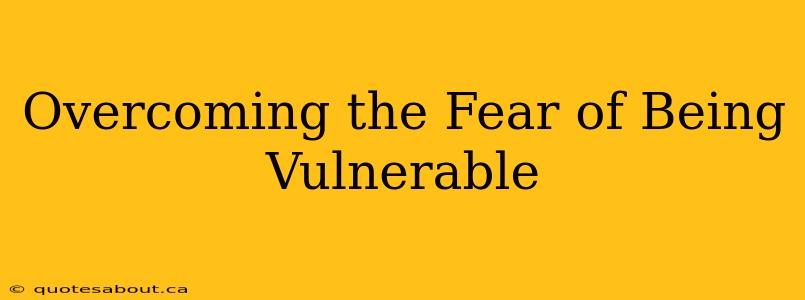Vulnerability. The word itself can evoke feelings of unease, even fear. It conjures images of weakness, exposure, and potential rejection. Yet, the truth is, vulnerability is the cornerstone of authentic connection, deep intimacy, and a truly fulfilling life. This fear, however, is a common human experience, rooted in our primal instincts for self-preservation. But it's a fear that can—and should—be overcome. This guide will explore the roots of this fear, offer practical strategies for conquering it, and illuminate the transformative power that lies on the other side.
What is Vulnerability?
Before we delve into overcoming the fear, let's clarify what vulnerability truly means. It's not about weakness; it's about courage. It's about showing up authentically, sharing your true self—your hopes, dreams, fears, and imperfections—with others. It's about being willing to risk being seen, even if it means risking rejection. It involves letting down your guard and allowing yourself to be known, flaws and all.
Why Are We Afraid of Being Vulnerable?
Our fear of vulnerability often stems from past experiences. Perhaps we've been hurt in the past, betrayed, or rejected when we dared to be open and honest. This can lead to a protective shell, a defense mechanism to shield ourselves from further pain. Other contributing factors can include:
- Fear of rejection: The thought of not being accepted for who we truly are can be paralyzing.
- Fear of judgment: We worry about what others will think of our imperfections and insecurities.
- Fear of being hurt: Past experiences can make us apprehensive about opening ourselves up to potential pain.
- Perfectionism: The pressure to present a flawless image can make vulnerability feel impossible.
How Can I Overcome My Fear of Vulnerability?
Overcoming the fear of vulnerability is a journey, not a destination. It requires conscious effort, self-compassion, and a willingness to step outside your comfort zone. Here are some practical steps to help you on your path:
1. Identify Your Fears:
The first step is to acknowledge and understand the specific fears that hold you back. Journaling can be a powerful tool for exploring these emotions. Ask yourself: What are you afraid of losing if you become vulnerable? What are the worst-case scenarios you imagine? By bringing these fears to light, you can begin to address them.
2. Challenge Your Negative Thoughts:
Our minds often create exaggerated and unrealistic scenarios. Challenge these negative thought patterns. Ask yourself: Is this thought realistic? What evidence supports it? What would I tell a friend who was having this thought? Reframing negative thoughts into more balanced and realistic ones can significantly reduce anxiety.
3. Start Small:
Don't try to become completely vulnerable overnight. Start with small, manageable steps. Share a personal experience with a trusted friend or family member. Express a feeling you're usually hesitant to share. Each small act of vulnerability builds confidence and resilience.
4. Practice Self-Compassion:
Be kind to yourself throughout this process. Vulnerability is not easy, and setbacks are inevitable. Treat yourself with the same understanding and support you would offer a friend struggling with similar challenges. Remember that it's okay to make mistakes and to feel discomfort along the way.
5. Build Trust Gradually:
Choose people you trust to share your vulnerability with. Building strong, supportive relationships provides a safe space for self-expression. Don't rush the process; gradually deepen your connections as you feel more comfortable.
6. Focus on the Benefits:
Remind yourself of the potential rewards of vulnerability. Authentic connections, deeper relationships, and increased self-acceptance are just some of the benefits that await you. Visualize the positive outcomes and allow this vision to motivate you.
What are the Benefits of Being Vulnerable?
Embracing vulnerability is not a sign of weakness; it's a path to a more authentic, fulfilling, and connected life. The benefits are numerous:
- Stronger Relationships: Vulnerability fosters deeper connections and intimacy with others.
- Increased Self-Acceptance: Being open about your imperfections leads to greater self-compassion and self-acceptance.
- Enhanced Empathy: By being vulnerable, you create space for others to share their own vulnerabilities, fostering empathy and understanding.
- Greater Resilience: Learning to cope with the discomfort of vulnerability builds emotional resilience and strength.
- Improved Mental Well-being: Authentic self-expression contributes to a greater sense of well-being and reduced stress.
Is it ever okay to not be vulnerable?
While vulnerability is key to healthy relationships and personal growth, it's important to exercise discernment. There are times when it’s wise to protect yourself. Sharing deeply personal information with someone you don't know well or someone who has proven untrustworthy can be detrimental. It's crucial to assess the safety and trustworthiness of the relationship before exposing your vulnerabilities.
In conclusion, overcoming the fear of vulnerability is a courageous act that unlocks profound personal growth and strengthens relationships. By understanding its roots, employing practical strategies, and embracing self-compassion, you can unlock the transformative power of vulnerability and live a more authentic and fulfilling life. Remember, it's a journey, and every step forward, no matter how small, is a victory.

